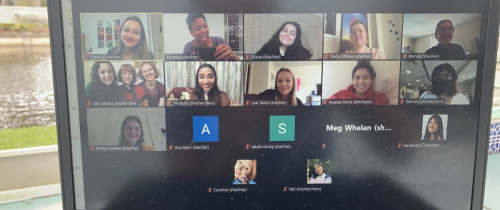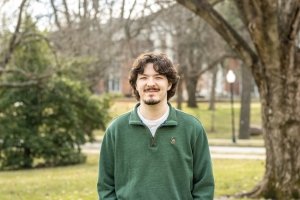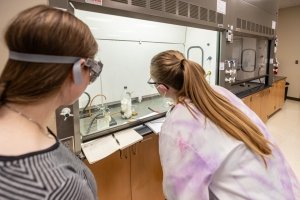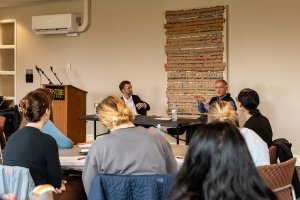
Anukriti Kunwar ’22 and Lorena Bonet Velazquez ’23 host workshops as part of self-initiated project funded through the Lincoln Scholars Program
Lincoln Scholars Anukriti Kunwar ’22 (Kathmandu, Nepal) and Lorena Bonet Velazquez ’23 (Louisville, Kentucky) hosted a sexual health promotion workshop series called “Let’s Talk Pleasure,” with self-initiated project funds through their Lincoln Scholarship. The students recently received approval to expand their presentation with Creative Thinking Immersion Program (CTIP) funding.
The four-day workshop series took place during the month of March over Zoom in solidarity with Women’s History Month. Centre participants in the hybrid peer-facilitated and speaker series were given a supportive space to explore, discuss and equip themselves with knowledge about sexual health. These workshops provided individuals with the skills needed to be able to communicate their enthusiastic consent, needs and boundaries.
“A lot of what we discussed during the workshop stemmed from our own individual conversations over Zoom this past summer,” Kunwar said. “We both shared with one another what we had learned and been taught by media, our families and culture regarding purity culture, hook-up culture and our bodies. We recognized that there was a huge gap in our understanding of sex, pleasure and our bodies that was a direct result of a systemic failure to provide us with comprehensive sex education.”
As a continuation of this series, Kunwar and Bonet Velazquez, along with Lexie Overstreet ‘24, will be working this summer to create a comprehensive sex education curriculum for CTIP that is gender-inclusive, pleasure-focused and trauma-informed, which will be institutionalized and implemented through the Title IX Office in the fall.
A new peer health education program, led by Sarah Cramer, Centre’s sexual assault prevention & education manager, will be available beginning in the fall. The program will allow 10 paid students to undergo training to facilitate a number of prevention and health education workshops, one of which being the sex education curriculum.
“Anukriti and Lorena put extreme care into ensuring the series was inclusive and trauma-informed,” Cramer said. “Because of this, their project stretched to meet even more needs for more students. I am so excited they have the opportunity to continue this work and can’t wait to facilitate an evidence-informed sexual health education program on a regular basis at Centre next year.”
Bonet Velazquez said she is passionate about making educational resources equitable and accessible to all.
“I believe that comprehensive sex education is a human right, and the lack of it in our society means that many of us are put at risk of perpetuating or experiencing sexual violence, as well as contracting sexually transmitted diseases,” she added. “Having access to comprehensive sex education means having the tools and knowledge to have pleasurable, safe and protective sexual experiences.
“Our systems’ failure to accurately teach us about our bodies leaves us vulnerable to violence,” she continued. “Not having equitable and comprehensive access to this education is a form of systemic violence. For me, this series was about alleviating the harm that the lack of sex education in our society has caused me and others around me. It was about challenging the sort of shame that we have been taught regarding sex and pleasure.”
At the end of the series, Kunwar said they conducted surveys to get a better understanding of what participants got out of the workshops.
“We were blown away by the deep reflections our participants shared with us,” she added. “Not only were we as a group able to be critical of our own personal social conditionings and limitations, but we were also successful in creating a safe space for one another to reflect and connect our personal experiences with larger problems of body illiteracy.”
Bonet Velazquez hopes participants were able to identify and start to challenge some of the shameful and inaccurate messages that they’ve received about this topic.
“I hope they learned that they are worthy and deserving of pleasure, and that there is nothing wrong with their bodies and sexual desires,” she said. “I also hope that they were able to leave this series with more skills and confidence to create a healthy and pleasurable sexual journey for themselves.”
Kunwar and Bonet Velazquez would like to thank Cramer; Jamie Shenton, assistant professor of anthropology; Ellen Prusinski, assistant professor of education; and Robert Schalkoff, director of the Lincoln Scholars Program, for their consistent guidance throughout the planning of the workshop. In addition, they would like to thank the Lincoln Scholars Program for helping fund their self-initiated project.
“We’re so excited to see it grow into an institutionalized initiative in the near future,” Kunwar and Bonet Velazquez concluded.



